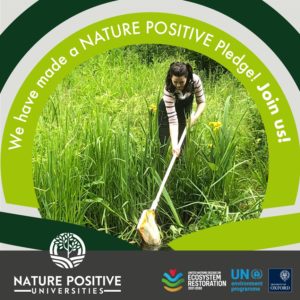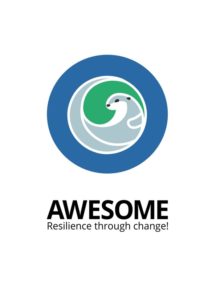Ecology
There are 12 Nature Improvement Areas (NIA) throughout England and our new Waterside Campus sits within the Nene Valley Way Nature Improvement Area, making biodiversity of Waterside Campus a fundamental part of the university’s sustainability ethos. The generation of a Biodiversity Management Plan as part of our planning has provided the basis for enhancing the natural habitat and the creation of new habitat. This includes planting species that attract insects and pollinators, which in turn attracts birds, bats and other wildlife. We are committed to the aims set out in our Ecology Policy (PDF) to ensure the continual management, conservation and education of ecology at the UON.
University of Northampton staff are actively involved in managing, monitoring and developing the flora and fauna on campus. Sightings of 78 bird species on or around the university grounds, species include the Peregrine, Kingfisher, Robin and Little Owl.
Ecology Zone
The new Ecology Zone, created in 2017, uses natural soils and substrates to create a varied habitat for wildlife. A recent survey of the Ecology Zone by the Botanical Society of Britain & Ireland recorded a total of 65 plant species in the Ecology Zone, with a further 79 species recorded across Campus, including plants previously thought extinct or rare in the county such as the Small-flowered Catchfly. You can also expect to see otters, heron, kingfisher, wetland birds, bats, dragonflies, butterflies and bees on Campus.
Nature Positive Universities

We have made a pledge to become a Nature Positive University in time for UN Biodiversity Conference (COP 15). Joining an alliance of universities around the globe, pledging to work towards a global Nature Positive goal to halt, prevent and reverse nature loss.
Project Awesome

Project Awesome is an initiative at the University which is a collective of students, academic and senior staff focusing on sustainability and wellbeing. The title of the group incorporates the groups aims:
Accessing Waterside’s Ecosystem Services: Observing and Monitoring the Environment
The aims of the project are to:
- Enhance, conserve, and protect wildlife and the environment in and around Waterside Campus
- Make Waterside one of the most biodiverse university campuses in the UK
- Promote Waterside as a place that nurtures staff and student health and wellbeing
- Encourage both students and staff in volunteering, observing wildlife and monitoring the environment
The project is currently led by the following members of staff:
- John Howes (External Services Manager)
- Dr Janet Jackson (Senior lecturer in Environmental ecology and management)
UON are proud to have been awarded GOLD accreditation for the Hedgehog Friendly Campus awards 2022/23!
Hedgehog Friendly Campus is a national biodiversity engagement programme, that supports universities, colleges, students’ unions and primary schools to create positive change for hedgehogs and other wildlife on their campus. Criteria within our framework set out to protect biodiversity, enhance habitats and educate staff and students on their own impacts.

What is No Mow May?
No Mow May is an annual campaign encouraging owners and managers of green spaces to refrain from mowing their lawn, throughout the month of May. Giving nature a much-needed boost, in a simple yet effective way.
Why are we taking part in No Mow May?
As a University we believe that we have a responsibility to lead by example in protecting natural environments and halting nature loss. Allowing wildflowers to grow freely throughout May provides essential foraging and nesting sites for important pollinators, such as bees, butterflies and moths. As pollinators are responsible for the reproduction of many plant species, they play a critical role in biodiversity gain, underpinning healthy ecosystems.
United Nations Sustainable Development Goals
We use the United Nations Sustainable Development Goals (SDGs) as a framework to guide our activity. Our ecology policy and projects are linked to the following SDGs:

Find out more about our impact on the SDGs